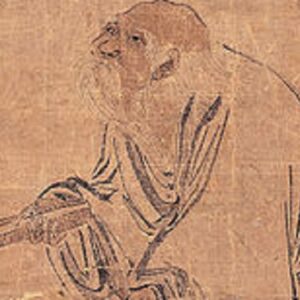Lao Tzu, also known as Laozi, was the founder of the Chinese philosophical ‘School of the Tao’ or ‘Taoism.’ He lived in the 6th century B.C. He was a contemporary of Confucius, the famed and revered Chinese teacher, and philosopher, but some traditions claim that they were the same person, while others claim that he existed before Confucius. Laozi’s origins and life are exceedingly enigmatic, and even after centuries of inquiry, little is known about him. Nonetheless, his teachings have been passed down over the decades, and he now has a large following. Though the philosopher lived in the Zhou Dynasty, the longest-lasting dynasty in primordial China, Laozi’s thought was notably well-known during the Han Dynasty. Taoism became well-established and was practiced as a religion during the Han Dynasty. However, Laozi’s life is not mentioned in any of the classic Taoist scriptures. Several hypotheses, misunderstandings, and even controversies surrounding Laozi’s life and death have arisen in recent decades due to a lack of knowledge. Many experts believe that Laozi’s religious and philosophical treatise, ‘Tao te ching,’ was not written by him alone. Others believe that the philosopher never lived and that Laozi might be referred to as any old wise man who espoused philosophy in ancient China.
Childhood and Adolescence
Lao Tzu’s personal biography remains a mystery, and there are numerous legends surrounding his birth and life. The ‘Shiji,’ published by historian Sima Qian in 145 BC, is the sole authentic biography of him.
Lao Tzu was born in the Ku County of the state of Chu, which is now Luyi County in Henan Province, according to the Shiji (his biography). His given name was ‘Li,’ and his designation was ‘Dan.’
According to legend, he was born after spending eight or eighty years in his mother’s womb, earning him the nickname “the old child.”
The Zhou Dynasty was flourishing at the time, and he worked as a’shi’ or historian at the royal court.
Around this time, he was said to have met the renowned Confucius and chastised him for his hubris. Confucius, on the other hand, was so enthralled by the scholar that he compared him to a dragon that flies through the sky on the winds and through the clouds.
Later the Years
After recognizing that the Zhou Dynasty was on the edge of collapse, Lao Tzu proceeded on a journey to the west. To reach the state of Qin, he journeyed to the Xiangu pass, where he encountered the guardian of the pass, Yinxi, who insisted the philosopher write a book.
He began composing a book called the ‘Daodejing’ at his request, which is a combination of the words ‘Dao’, which means ‘way,’ and ‘de,’ which means ‘its virtue.’ The book is a philosophical account that can be translated literally as “Classic of the Way of Power.”
The wise old man left Xiangu pass after finishing the book, and nothing was known about his movements after that.
Major Projects of Lao Tzu (Laozi)
Lao Tzu is best known for his work ‘Tao Te Ching’ or ‘Daodejing,’ which has 81 short poems conveying philosophical and theological teachings concerning ‘Taoism.’
He developed ‘Taoism’ or ‘Daoism,’ a way of life that focuses on living in harmony. There are two types of Taoism: philosophical and religious Taoism.
Philosophical Taoism, sometimes known as the “school of Dao,” is based on the ancient Chinese scriptures ‘Daodejing’ by Lao Tzu and ‘Zhuangzi’ by a philosopher of the same name.
Religious Taoism, on the other hand, refers to a group of organized religious movements that share Daojia’s ideas (family of Dao).
Personal History and Legacy
Many popular traditions claim that the philosopher married and had a son named ‘Zong,’ who went on to become a great soldier.
The Han Dynasty was the most affected by Lao Tzu’s ideas and ‘Daoism.’ In 142 C.E., the Daoist movement is known as the “Way of the Celestial Masters” or “Tianshi Dao” arose from the notion that Lao Tzu was one with God. The movement was in charge of modern-day Sichuan’s legislation, implying that Sichuan was formerly a theocratic state.
The philosopher preached the importance of ‘nature’ in our lives through the ‘Tao Te Ching,’ and that everyone should return to it. Naturalness is the central theme of the book, which discusses the most basic state of all things.
Lao Tzu became known as a personification of ‘Tao,’ which means ‘way’ or ‘principle,’ in order to restore the ‘Way.’ He highlighted the need for simplicity in life, spontaneity, and a lack of attachment to wishes.
Taoism is based on the belief that “Natural, spontaneous, eternal, nameless, and indescribable is the One. It is both the start of everything and the means in which everything moves forward.” The ‘route’ or ‘method’ it discusses is frequently referred to as “universal flow.”
Estimated Net Worth
The estimated net worth of Lao Tzu (Laozi) is unknown.
Trivia
This ancient Chinese philosopher and founder of ‘Taoism’ was claimed to have spent eight or eighty years in his mother’s womb before being born.
According to mythology, this ancient Chinese named himself ‘Tan’ and lived 129 years after the death of the renowned ‘Confucius.’


